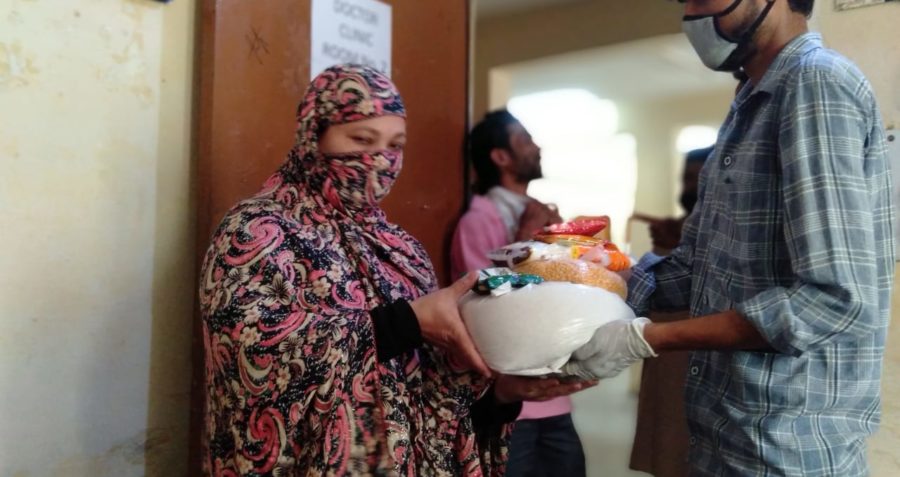Communities bridge the gap in both HIV and COVID-19 response
 © Alliance India
© Alliance India
Around the world, our partners and their community networks are going the extra mile to ensure critical health services are maintained during the COVID-19 crisis.
Frontline AIDS’ partners have a wealth of experience when it comes to tackling a global health emergency. They are now drawing on that expertise and rising to the daily challenges of lockdown.
India and Uganda are just two examples where community networks are proving truly life-saving. Volunteers are delivering not only crucial drugs – including antiretrovirals (ARVs) for people living with HIV, and opioid substitution therapy (OST) for those who use drugs – but also food rations and hygiene essentials to some of the most vulnerable in society.
A multi-pronged approach
With experience of cholera and Ebola, Uganda’s health system is used to operating in crisis mode, but the current pandemic has nonetheless thrown up new problems to solve. The price of some key commodities such as drugs for opportunistic infections and masks has risen dramatically. Physical distancing means that clinic waiting areas have had to be rearranged and additional hand sanitiser stations set up.
Dr Pasquine Ogunsanya heads up Alive Medical Services (AMS), a non-profit medical centre based in one of Kampala’s most impoverished neighbourhoods and a key partner of Frontline AIDS’ SRHR Umbrella Grant.
“Because we provide comprehensive HIV services free of charge,” she says, “and because the people we take care of are very marginalised and poor, we knew we had to put strategies in place to make sure they get their medication. We have had to be very flexible – the staff and the clients.”
No public transport means many people can’t get to the clinic. Getting treatment to them could have proved the biggest headache, but this is where AMS’ well-established connections with the community have come into their own. Peer educators have been delivering medications by bicycle. Motorbike riders are helping out and, in some places, one community member makes the journey to clinic to pick up ARVs on behalf of many others.
“We’re a high-volume clinic,” says Dr Ogunsanya, “so it’s a lesson that we can use community distribution of medication rather than having the clinic full of clients. In solving the issue of continuous HIV services in this COVID-19 response, we need to use a number of different approaches because not one will fit all.”
Providing a lifeline
For Alliance India, a major concern is keeping people who use drugs alive and healthy by ensuring harm reduction services continue. As in Uganda, it is existing community networks that are extending a lifeline to a population that might otherwise be overlooked.
Recent investment by Alliance India and Frontline AIDS in drug-user forums at both state and national level is already paying dividends in the coronavirus pandemic. The community of people who use drugs sprang into action when lockdown was announced. They put in place systems to deliver the OST drug buprenorphine, clean needles and syringes, and even sanitary products for female drug users.
Charanjit Sharma, Alliance India’s harm reduction programme manager, says: “This is an example of the effectiveness of using the community network in an emergency situation. The community felt there was a need and so the community came together and started dividing responsibility for who should be doing what. It just happened spontaneously.”
Beyond lockdown
Changes in market dynamics – namely the increase in the price of drugs like heroin – means the demand for buprenorphine has gone up, because it is needed to counter acute withdrawal symptoms.
Kunal Kishore, Alliance India’s associate director for harm reduction, says: “These drug-user forums are now filling in the strategic gaps.” With Alliance India’s support, the forums have been busy lobbying for new clients to be accepted in harm reduction programmes, and for take-home supplies of OST to be initiated in some states.
With help from Frontline AIDS, Alliance India is also in the process of setting up six additional drug-user forums to be able to quickly provide naloxone, an antidote for opioid overdoses. “We are anticipating that there will be a large number of overdoses that is going to happen,” says Kunal, “as drugs will start to come on to the market again.”
Charanjit says: “We should continue investing in community system strengthening because the community is at the forefront, whether it’s HIV, whether it’s hepatitis C, or whether it’s coronavirus.”
The speed and agility with which the drug-user forums have mobilised has without doubt saved lives. Many governments would do well to take note.
Tags
Alliance IndiaCOVID-19Harm reductionHIV preventionIndiaUganda

